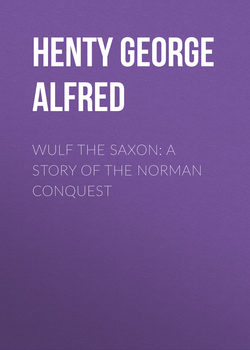Читать книгу Wulf the Saxon: A Story of the Norman Conquest - Henty George Alfred - Страница 7
CHAPTER VI. – RELEASE OF THE EARL
ОглавлениеIn a few minutes the three horses were brought out. Wulf and Beorn were much pleased with the animals that had been placed at their service. They were powerful horses, which could carry a knight in his full armour with ease, and seemed full of spirit and fire. They were handsomely caparisoned, and the lads felt as they sprang on to their backs that they had never been so well mounted before.
"You would have made the journey more quickly and easily if you had had these horses three days ago," young De Burg laughed.
"Yes, indeed. There would have been no occasion to hide in the woods then. With our light weight on their backs they would have made nothing of the journey."
"You must not expect to see a castle," De Burg said presently, "though I call it one. In his early days the duke set himself to destroy the great majority of castles throughout Normandy, for as you know he had no little trouble with his nobles, and held that while the strength of these fortresses disposes men to engage either in civil war or in private feuds with each other, they were of no avail against the enemies of the country. My father, who is just the age of the duke, was his loyal follower from the first, and of his free will levelled his walls as did many others of the duke's friends, in the first place because it gave the duke pleasure, and in the second because, had only the castles of those opposed to the duke been destroyed, there would have been such jealousy and animosity on the part of their owners that matters would never have quieted down in the country. Thus it is that throughout the land you will find but few castles remaining. The nobles felt it strange at first to be thus dwelling in houses undefended against attack, but they soon learnt that it was far more convenient than to be shut up within massive walls, and the present dwellings are much larger and more comfortable than those of former days. The duke said rightly that the abolition of fortresses well-nigh doubled his fighting power, for that so many men were required to garrison them as to greatly diminish the number their lords could take with them into the field. You do not have castles in England, do you?"
"No, we live in open houses, and hold that it is far better and more pleasant to do so. There is no fighting between neighbours with us. The great earls may quarrel and lead their forces into the field, or may gather them against Danish and Norwegian pirates, but except on these occasions, which are rare, all dwell peaceably in their homes."
The horses were fresh, and the five miles quickly passed over.
"There is the house," De Burg said, pointing to a large building standing on an eminence. It was castellated in form, and much of the old building had been incorporated with the additions, but the outer wall had been pulled down and the moat filled up. Broad casements had replaced the narrow loopholes, and though the flag of the De Burgs still waved over the keep, which stood a little apart from the rest, the family no longer dwelt in it.
